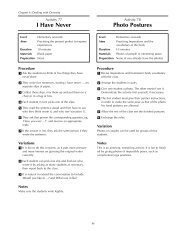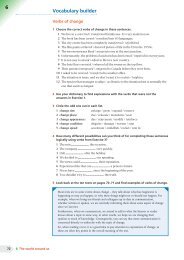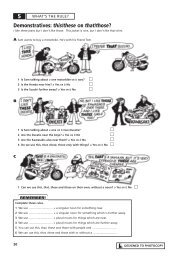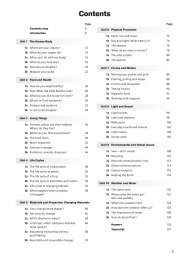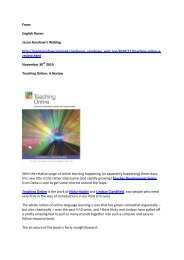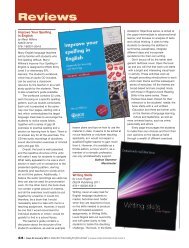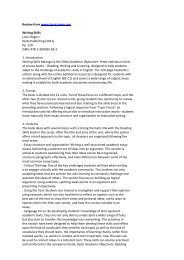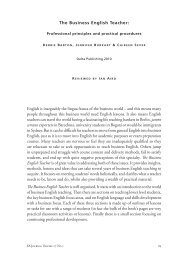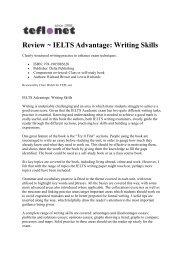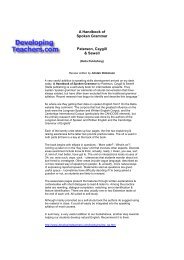PDF - Delta Publishing
PDF - Delta Publishing
PDF - Delta Publishing
You also want an ePaper? Increase the reach of your titles
YUMPU automatically turns print PDFs into web optimized ePapers that Google loves.
http://reviews.hotchpotchenglish.com/<br />
T U E S D A Y , 3 J U L Y 2 0 1 2<br />
Book Review: 'Digital Play' by Kyle Mawer & Graham Stanley<br />
Kyle Mawer and Graham Stanley are two gaming enthusiasts who, after seeing the potential<br />
of computer games of various sorts in language teaching, went on to post their ideas on the<br />
Digital Play blog before finally researching and writing this book.<br />
The principle is eminently attractive: learning language through playing, in this case, already<br />
phenomenally popular computer video games of one kind or another.<br />
The practical aspects, however, are another story altogether. I speak from experience of<br />
letting classes of kids lose in the computer room; aims and rules are worth their weight in<br />
gold, I can tell you.<br />
That's where Digital Play comes into its own. The start of the book is all about the concepts<br />
behind computer games and learning. Successive sections link computer games up with<br />
society, education, language learning, language teaching and language aims. Each section is<br />
fascinating and revelatory in its own right, as we realise the extent to which 'virtual' on-line<br />
worlds have become virtual reality for a vast number of people.<br />
As someone who has more or less avoided these things I'm keen to discover exactly where<br />
we are with them now. I have to admit to two waves of on-line gaming addiction though.<br />
The first was Second Life, the virtual world where you move your little 'avatar' around, build<br />
things, buy things, 'socialise', and so on. You very quickly get dragged into spending some<br />
decidedly unvirtual money and finally having a 'bad experience' (the 'land' I was renting to<br />
hold my three stunning art and photography galleries was sold off behind my back,<br />
ironically, to a games emporium developer) and moving on to other things.<br />
The second round of addiction affliction was a game called Farmville, highly dependence<br />
creating, not to mention contagious - the whole of my family was rapidly spending hours<br />
clicking on virtual fields to grow virtual crops to buy virtual windmills and all sorts of<br />
nonsense. I've been 'clean' for several months now, unless blogging falls into that category
of dangerous computer pastimes.<br />
Anyway, after a dozen pages of good solid scene-setting, we have a glossary covering a<br />
mind-boggling number of game genres, including adventure, first person shooter (FPS),<br />
dressing up, arcade, singing and music, simulation, puzzle and role-playing games to name<br />
but a few. So that's what people do in their spare time and when they're arriving late for<br />
work...<br />
Then there's an equally comprehensive list of sites about and supplying games, and then<br />
many actual games themselves, under the triple whammy heading of Some great games,<br />
great to play, great to use, so I can only assume they are.<br />
The second part of the book, divided into four sections entitled Game on!, The nonconnected<br />
classroom, The connected classroom, and Multiple connections, is where we get<br />
down to business. Ninty-odd half to one-page lesson plans take us through one of the<br />
aforementioned games from a teacher's perspective. There are indications for what to do to<br />
prepare the students, guide them through the games and follow up afterwards, all concisely<br />
presented in short bulletpointed lists.<br />
The main skills focus of the exercises is given for each in terms of reading, writing, listening<br />
and speaking, and the variety of ideas presented is admirable and goes far beyond just<br />
playing the game in English or describing what they did afterwards which would be a recipe<br />
for lazy language teaching and inefficient learning.<br />
The third and final part of the book is for teachers who would like to take things to the next<br />
level. Notably on integrating their new digital teaching passion into an existing, possibly<br />
inflexible syllabus. Ways of developing further are also covered, including new teaching<br />
paradigmes for the 21st century, reading up on the extensive existing literature right the<br />
way through to creating your own games and activities. The important aspect of computer<br />
room management gets a nod and we should remember that the authors' Digital Play blog<br />
often provides further ideas based on the concepts covered in the book.<br />
Reviewed by Sab Will of Hotch Potch English<br />
http://reviews.hotchpotchenglish.com/



